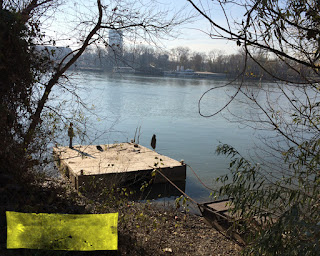In an ode to Epharmostus, Pindar includes a passage in the middle about the victor's earlier triumphs (a "now and then"), showing how our hero, though young, was not allowed to compete with youths, so was faced with elder rivals, who one imagines to be more experienced, and manages to endure and prevail. The drama of this suspense cedes to cheers reverberating in the arena, which you can practically feel as you read:
in Marathon, torn from beardless antagonists, he stood the onset of older men for the silver vessels. He threw these in his speed and craft with no fall scored against him and walked through the ring to loud acclamation in the pride of his youth
Sometimes when I read Pindar, I stop reading his message and dwell instead on the characters or themes he brings up in a single poem, and forge my own associations, imagine my own poem.
This poem (Olympian 9) mentions a character called Telephus. He is mentioned in the poem as a stand-in for the concept of foe - a counter to a faithful character (Patroclus) born of the land that produced our athlete victor.
Pindar does not mention here that Telephus was wounded by Achilles, nor how the wound would not heal so Telephus consulted the oracle at Delphi and learned that what had wounded him would heal him, or how he was ultimately healed when scraps of the spear that had injured him were rubbed on the wound. Frazer cites this as an example of "sympathetic magic" in his Golden Bough. I wonder if this story is relevant to the poem because Pindar does mention Heracles, with a strange twist: at once exemplary and inadequate, and in one account of the Telephus wound story, we know that he reached his cure by invoking Heracles.
It is interesting to consider the relationship between what ails and cures. This is almost a holiday message.
But that is not all that I want to share in this holiday post, because there's a depth to ailments when other bonds with nature are strained.
In my case: trying to accept who I am without that urgent flailing towards "better". To all this, Pindar says: natural talent is far better than learned abilities, especially where the latter lacks the divine component. In his words:
That which is inborn is always the best; but many men strive to win glory with excellence that comes from training. Anything in which a god has no part is none the worse for being quelled in silence. For some roads lead farther than others ... The paths to skill are steep things to winSo as the fireworks continue to rumble in this little city that produces so much light, I leave you with the idea of catharsis: for wounds, but also for a recognition of the talents "inborn" - what is sought is found. Here's to the endeavour! (This post is a variation of the original on my other blog. Translations of Olympian IX a combination of Svarlian and Lattimore.)
Brush: Misprinted Type.



No comments:
Post a Comment